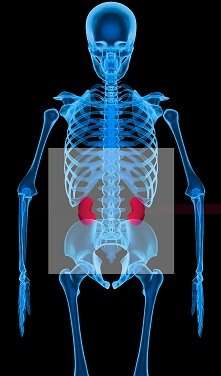Medicare-funded multidisciplinary care is likely to be cost-effective in patients with chronic kidney disease. Credit: Josh Plueger, US Air Force
Medicare-funded multidisciplinary care programs in the US are likely to be cost-effective in patients with mild to moderate chronic kidney disease (CKD), according to a new study published this week in PLOS Medicine by Eugene Lin from Stanford University, California, USA, and colleagues.
Multidisciplinary care—when healthcare providers of different expertise collaborate to treat a single disease—has been shown to reduce mortality and the incidence of end-stage renal disease in patients with CKD, but the cost-effectiveness of such programs remains unclear. In the new study, researchers used a modeling approach to estimate the cost-effectiveness of a theoretical Medicare-based multidisciplinary care program, including nephrologists, advanced practitioners, educators, dieticians, and social workers, for patients with stage 3 and 4 CKD.
Using Medicare claims data and data from published literature, they estimate that multidisciplinary care meets meet conventional cost-effectiveness thresholds in middle-aged to elderly patients with mild to moderate CKD, adding 0.23 (95% CI: 0.08, 0.42) quality-adjusted life years (QALYs) over usual care, with a cost of $51,285 per QALY gained. Multidisciplinary care was estimated to be generally more cost-effective in patients with higher urine albumin excretion. While the proposed program is theoretical and may not generalize to populations at low risk for progression to end stage renal disease, the findings provide evidence to support implementing Medicare-funded multidisciplinary care programs for patients with mild to moderate CKD.
In a linked Perspective, Richard Fluck and Maarten Taal from Royal Derby Hospital, UK, discuss some of the unknowns in implementing multidisciplinary programs for patients with CKD and argue for the need to develop packages of multidisciplinary care that are best suited to patients' risk profiles and CKD stage. The authors say "Much remains to be done to identify the optimal package of care for different patient subgroups, but we agree with the authors that the data provide sufficient evidence to support initiation of pilot MDC programmes as well as further research to identify optimal models for implementation."
More information: Lin E, Chertow GM, Yan B, Malcolm E, Goldhaber-Fiebert JD (2018) Cost-effectiveness of multidisciplinary care in mild to moderate chronic kidney disease in the United States: A modeling study. PLoS Med 15(3): e1002532. doi.org/10.1371/journal.pmed.1002532
Journal information: PLoS Medicine
Provided by Public Library of Science






















